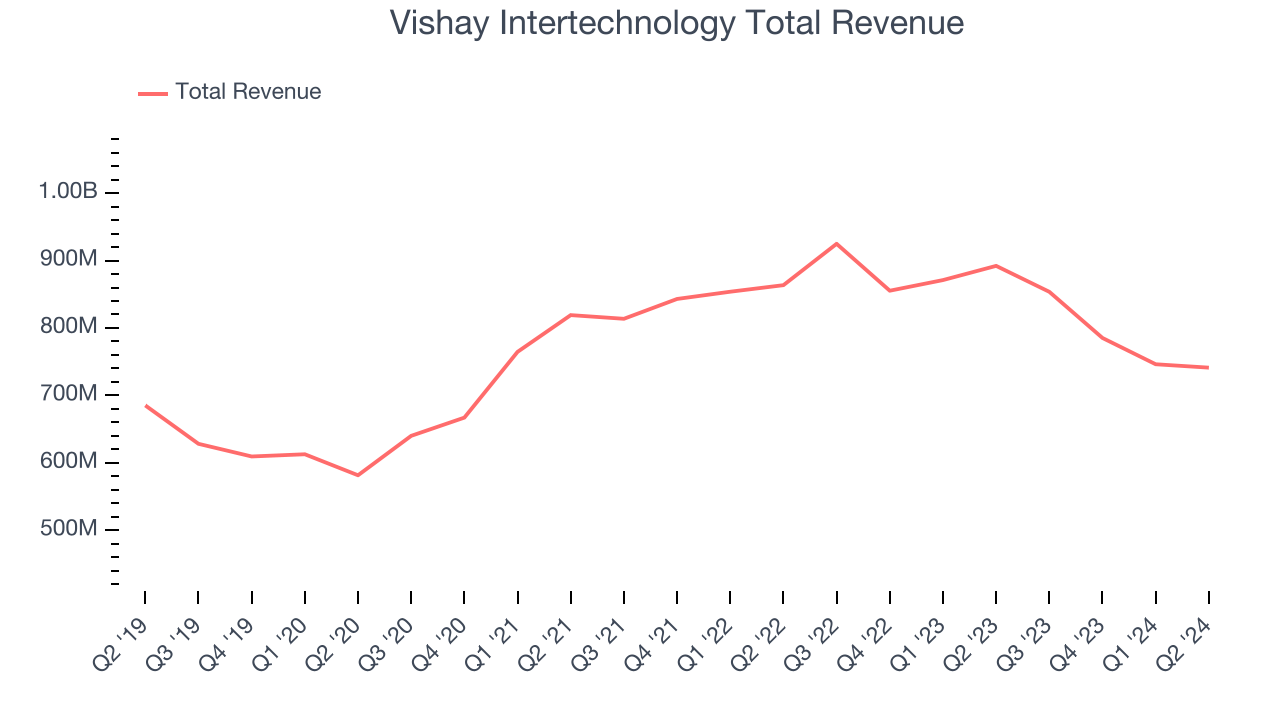Semiconductor manufacturer Vishay Intertechnology (NYSE:VSH) missed analysts' expectations in Q2 CY2024, with revenue down 16.9% year on year to $741.2 million. Next quarter's revenue guidance of $745 million also underwhelmed, coming in 4.2% below analysts' estimates. It made a GAAP profit of $0.17 per share, down from its profit of $0.68 per share in the same quarter last year.
Is now the time to buy Vishay Intertechnology? Find out by accessing our full research report, it's free.
Vishay Intertechnology (VSH) Q2 CY2024 Highlights:
- Revenue: $741.2 million vs analyst estimates of $753.9 million (1.7% miss)
- EPS: $0.17 vs analyst estimates of $0.15 (13.3% beat)
- Revenue Guidance for Q3 CY2024 is $745 million at the midpoint, below analyst estimates of $777.3 million
- Gross Margin (GAAP): 22%, down from 28.9% in the same quarter last year
- Inventory Days Outstanding: 106, in line with the previous quarter
- Adjusted EBITDA Margin: 11.9%, down from 20.1% in the same quarter last year
- Free Cash Flow was -$86.78 million, down from $27.88 million in the previous quarter
- Market Capitalization: $2.95 billion
“During the second quarter, we executed well on our Vishay 3.0 strategic plan, deepening our customer engagements supported by capacity that has landed and that we will continue to expand, and advancing our silicon carbide strategy as we prepare for the megatrends in sustainability and e-mobility,” said Joel Smejkal, President and CEO.
Named after the founder's ancestral village in present-day Lithuania, Vishay Intertechnology (NYSE:VSH) manufactures simple chips and electronic components that are building blocks of virtually all types of electronic devices.
Analog Semiconductors
Demand for analog chips is generally linked to the overall level of economic growth, as analog chips serve as the building blocks of most electronic goods and equipment. Unlike digital chip designers, analog chip makers tend to produce the majority of their own chips, as analog chip production does not require expensive leading edge nodes. Less dependent on major secular growth drivers, analog product cycles are much longer, often 5-7 years.
Sales Growth
Vishay Intertechnology's revenue growth over the last three years has been unimpressive, averaging 3.7% annually. This quarter, its revenue declined from $892.1 million in the same quarter last year to $741.2 million. Semiconductors are a cyclical industry, and long-term investors should be prepared for periods of high growth followed by periods of revenue contractions (which can sometimes offer opportune times to buy).

Vishay Intertechnology had a difficult quarter as revenue dropped 16.9% year on year, missing analysts' estimates by 1.7%. This could mean that the current downcycle is deepening.
Vishay Intertechnology's revenue growth has slowed over the last three quarters and its management team projects revenue to fall next quarter. As such, the company is guiding for a 12.7% year-on-year revenue decline, but Wall Street thinks there will be a recovery next year. Analysts' estimates call for 3% growth over the next 12 months.
Here at StockStory, we certainly understand the potential of thematic investing. Diverse winners from Microsoft (MSFT) to Alphabet (GOOG), Coca-Cola (KO) to Monster Beverage (MNST) could all have been identified as promising growth stories with a megatrend driving the growth. So, in that spirit, we’ve identified a relatively under-the-radar profitable growth stock benefitting from the rise of AI, available to you FREE via this link.
Product Demand & Outstanding Inventory
Days Inventory Outstanding (DIO) is an important metric for chipmakers, as it reflects a business' capital intensity and the cyclical nature of semiconductor supply and demand. In a tight supply environment, inventories tend to be stable, allowing chipmakers to exert pricing power. Steadily increasing DIO can be a warning sign that demand is weak, and if inventories continue to rise, the company may have to downsize production.

This quarter, Vishay Intertechnology's DIO came in at 106, which is 16 days above its five-year average, suggesting that the company's inventory has grown to higher levels than we've seen in the past.
Key Takeaways from Vishay Intertechnology's Q2 Results
We struggled to find many strong positives in these results. Although its EPS beat analysts' estimates, its sales and full-year revenue guidance missed Wall Street's expectations. Overall, this quarter could have been better. The stock remained flat at $21.33 immediately after reporting.
Vishay Intertechnology may have had a tough quarter, but does that actually create an opportunity to invest right now? When making that decision, it's important to consider its valuation, business qualities, as well as what has happened in the latest quarter. We cover that in our actionable full research report which you can read here, it's free.
